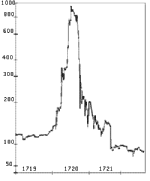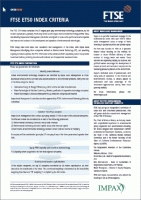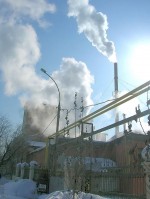Once upon a time, on the edges of Fangorn Forest, Gimli son of Glóin grasped the haft of his axe and eyed up the tree next to him.
He was in full flow about this “horrid, dark, dank, tree-infested” forest when a threatening rumble from the forest itself brought him up short.
Suddenly the dwarf realised the trees around him were in fact “charming, quite charming”, and in all likelihood avoided the environmental disaster of a-branch-dropped-on-the-head as well.
So the tension between dwarf and tree was interpreted by Peter Jackson in his film adaptation of JRR Tolkien’s “The Two Towers”.
It appears a similar rumble is starting to be heard amongst investors and those who serve them, the index companies. The most recent response comes from FTSE, who have just launched a new “Green Index”.
FTSE of the Light Green Tinge
The FTSE Group has long since left behind its origins as a joint venture between the Financial Times and the London Stock Exchange, although both still maintain a significant interest in the company.
The business was made independent in 1995 and started international expansion in 1999. It now runs over 100,000 indices and works in over 77 countries.
The latest addition to these is its Environmental Technology (ET) Index Series. This has an international reach and is in essence the Environmental Technology Index launched by environmental investment company Impax in 1999.
In order to be considered for entry a company has to be involved in one of three areas of sustainability:
- Alternative Energy and Energy Efficiency
- Water Technologies and Pollution Control
- Waste Technologies and Resource Management
Next, a company’s commitment is measured by examining the revenue, capital investment and NET income generated by its environmental technology activities.
If one or more of these activities is over 20% of the corporate whole then they are considered for entry to the ET All Share Index. If it is over 50% then they are considered for entry to the ET50 Index of the top 50 performers.
Little Baby Steps
The ET Index compliments FTSE’s other sustainability index, FTSE4Good, quite nicely. The former concentrates upon environmental impact while the latter focuses upon ethical and governance issues.
When businesses, investors and analysts talk about sustainability they usually refer to measuring performance against financial, social and environmental criteria.
This is a reference to the Triple Bottom Line, introduced by John Elkington in “Cannibals With Forks”. Here he proposed that companies’ performance should be measured in equal part against social, environmental and financial criteria.
Together, the ET and FTSE4Good series comprise 11 of the 100,000 indices which FTSE manages.
This means only 0.01% of FTSE indices have entrance criteria concerned with social or environmental performance. The remaining 99.99% of the indices are concerned with other conditions. In addition, all the indices measure financial performance.
Let Us Be Hasty
All of which leads to the conclusion that sustainability is gaining ground only in teeny-weeny baby steps within the business community and is barely considered as a factor by investors.
Many businesses and analysts happily declare that they embrace sustainability and yet they will also opine the “money is the only game in town”. They seem oblivious to the contradiction and unable to understand what true sustainability entails.
The FTSE ET Index fails in its ambition in precisely the same way. It wants to contribute to the measurement of sustainability performance but in the end it measures only financial performance.
This reliance upon financial measurements means the FTSE ET Top Ten includes four of the USA’s top polluters. Together these companies create over 0.5% of the pollution in the USA’s air, more than traditional polluters such as Boeing, General Motors or Dow Chemical.
It also includes a company currently under investigation for huge EU-wide price-fixing, bribery and corruption. Fines levied against the company are creeping towards €0.5bn with the present legal process expected to finish in August 2008.
The creative imagination needed to think and act differently is lacking. Are collaborative solutions such as social bookmarking and wikis the solution, or is that too obvious and something more radical is required?
What is certain is that unless the belief that wealth is more important than anything else is changed, the environment’s rumbling will grow ever louder and sustainability will remain beyond our reach.
Picture Credit: “Industry” by Summ
A former CTO, Chris has a broad and varied background. He’s been involved with blue chips, consultancies & SMEs across a wide variety of sectors and has worked in Europe, the Middle East and Australia.
In 2007 he decided to combine his knowledge of business and IT with his passion for all things sustainable and has been busy writing ever since. However, his greatest ambition remains to brew the perfect cup of coffee.



